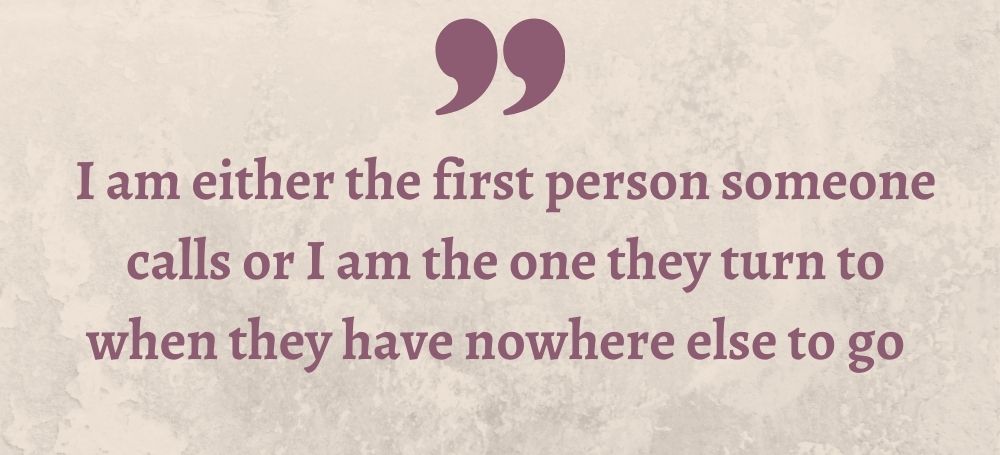The term Gaslighting originates from play that was made into a film called ‘Gas Light’ where the husband manipulates his wife to make her think she’s actually losing her sense of reality and going mad. The name comes from the part of the film where the husband tampers with the gas lights causing them to dim and when his wife comments on it he tells her she is imagining that the lights dimming.
Gaslighting can happen in romantic relationships, as well as friendships or in families
The other person will insist their version of reality is correct and your version is wrong. They do this by questioning your thoughts, your memories and your experience of a situation. They are so fixated on their version that they want to convince you they are right and you are wrong.

With Gaslighting there is no compassion for another person’s perspective because the person who is doing the Gaslighting is so invested in their version that its more important for them to be right than reasonable.
If someone tries to convince that you are wrong you have every right to question that. If they persist and insist on questioning your thoughts, your memories, your experience of a situation – again you have every right to question that. It is so important that we deepen our self awareness so that when it comes to situations such as these we have the strength of mind to know our own truth even if it means disagreeing with another. Often times people choose harmony over their own truth. It is important that we are comfortable with our truth and comfortable enough with ourselves to humbly disagree. We don’t have to get angry we can simply agree to disagree.
“without self awareness we are as babes in the cradles” – Virginia Woolf
If we start by looking at confusion. On that spectrum of being slightly confused to being really confused and questioning your reality Gaslighting sits at the end of the far end of the spectrum. Specifically, it’s when another person tries to convince you that their version of reality is correct, and your version is wrong. They insist on questioning your thoughts, your memories, your experience of a situation. They’re so fixated on their version that they are insisting that they are right, and they will not consider the fact that you may have experienced the situation differently. This is often used by people who have serious issues, and they can use it as a mechanism to control you because the more confused you are on the spectrum of slightly confused to very confused, the easier you are to manipulate.

It is important to understand Gaslighting, so you can deal with it if you are on the receiving end of it. It Is important to understand that it’s somebody else’s version of reality that they are insisting is true. We can all reason that two people can have very different experiences of the same situation, because we all see things from our own perspective. So it is the case that one person’s truth may not be another person’s truth on the basis of how they experienced the same thing but from different perspectives or perceptions. Therefore one person’s experience of a particular situation may be very different to another’s. And if you’re in a reasonable state of mind and not in the heat of an argument, it’s quite easy to see and to step back and to question and ask, even, “What was your experience and why did you feel like that? Well, I can see if you thought that, or if you interpreted it in such a way, that you might feel like that even though it is not how I saw the situation at all”.
When we go into the realms of Gaslighting, there is none of that. There is not that level of reasonableness. There is none of that compassion for another person’s perspective. It’s very much driven by an individual’s agenda, and they have very specific reasons for wanting to believe and hold on to their version of a truth. Quite often, it may be related to erroneous beliefs they have about you. They may be looking for evidence that, “Oh, yet again, you’ve let me down and I knew you would,” and you maybe thinking, “Well, hang on. That’s not actually what happened.” But in their mind, because that’s the belief they want to hold on to, they create a version or interpret, or you could say, they experience their reality in a very specific way. Gaslighting is when the other person wants you to acknowledge that their reality is correct, that you owe them an apology for something you may or may not have said, something you may or may not have done. In their mind they believe that they are right and you are wrong. In fact they will sometimes invent things so as to support their way of seeing things or their views and opinions.

Gaslighting is very much part of the controlling mechanism, and as mentioned sits on a sliding scale of confusion, it sits right at the far end. If you are on the receiving end of Gaslighting it can make you start questioning your reality. You may find that the other person is telling you what you believe to be true is wrong and they can be very convincing. When someone is so convincing its not surprising that we question ourselves because it is hard to imagine why on earth they would be making things up. You may start to doubt yourself and start thinking, “Hang on. Well, maybe… Did I…” If you are really sure that what they are saying is wrong and you fight back with “I absolutely didn’t”, then you will find yourself embroiled in the game.
Someone who is Gaslighting you wants you confused in a Gaslighting scenario. If you’re on the receiving end of their Gaslighting, they want you confused. They want you arguing. They want you engaged in some sort of drama, because it suits whatever agenda, whatever ends they’re trying to get to, which is usually to make you wrong, to make them right, because they have such a fixated view and they want to believe that their version of reality is real because it supports their belief system.

The trick is to recognise what is happening and to step out of the game. If you are currently or if you have ever experienced Gaslighting I would invite you grab a notebook and to jot down the Gaslighting situation, and to jot down exactly how you feel or felt about it, because I think how we feel can be a flag. When that flag goes up, you can think, “Perhaps this is a Gas lighting scenario, and therefore I can employ The Buzz for Gaslighting (word, term or affirmation) which I will come onto.
Imagine you’re in the situation and maybe you’ve been in it often, or maybe you haven’t experienced it yet, but let’s just explore it, where someone is insisting that their version of reality is completely different to what you experienced. Not only are they insisting that their version is true, but they want you to acknowledge, and accept their version and they may even go as far as to want you to apologise for something that they believe has been said or done which you believe has not been said or done.
Understandably when put in this position it is going to be confusing. You will be questioning what is going one, you might feel a bit fuzzy, you might feel a bit disorientated, you might feel a bit displaced. This is because we anchor our day in experiences and in thoughts and in things that have happened. It is confusing when your reality is challenged you may think “Hang on, that didn’t happen the way I thought it did? Really? but I thought that it did. But you’re insisting that that’s not what happened. You’re telling me I said something that maybe I didn’t. You’re telling me I did something that maybe I didn’t, or you’re telling me that I had some intention behind something I’ve said or done, which I didn’t?” The person doing the Gaslighting may change events and they may attribute intentions that were never there they may say something like,”Oh, you did that because you’re spiteful.” There may have been no spite whatsoever in your actions but the other person reads intention into things because it fits into how they want to think and what they want to believe.

All of this is part of the game that leads us to confusion and ultimately results in us feeling disempowered. If we’re not in a state of neutrality and ease within ourselves, then we are not empowered and we are therefore more easily manipulated. So in your notebook we are looking at how it feels so you can jot it down in your notebooks- you might feel fuzzy, you might feel disorientated, as we’ve talked about. You might feel tired, you might feel that you want to distract yourself and go and eat something, or you just might feel that there’s no point arguing. You might feel depressed. You might feel challenged. You might feel misunderstood. You could feel a whole host of things.
So take this opportunity to write down and explore how you feel when a Gaslighting situation comes up, where your reality is being questioned, just jot down how you feel. Then you can start to recognise when Gaslighting is happening, then the next time you feel that way, you can acknowledge, “Oh, maybe this is Gaslighting”. And if it is Gaslighting, and they’re insisting that the situation was one way and you experienced it very differently, then you can employ The Buzz (word or term or phrase) that we’re using for this, which is, “My truth is different to your truth, and that’s okay.”
The Buzz
My Truth is different to your truth and that’s OK
And as with all of these Buzz phrases, this is something for you to think about within your own mind, not necessarily something to share. It may be too challenging for you to say “My truth is different to your truth and that’s OK” to someone who is Gaslighting you. It is however perfectly OK for you to think it and for you to use it to challenge the way you’re thinking about the situation. It gives you a chance to step off the Merry Go Round that the person Gaslighting you wants you to stay on. You can not change how they are thinking (and we can spend a lot of effort trying!) But you can change how you are thinking and therefore how you are feeling.
If you employ this Buzz “My truth is different to your truth and that’s OK” then you can step put of confusion and find clarity within yourself.
If someone really wants to believe this is what was said, or that is what happened, then that is what they’re going to believe. We can not change someone else’s mind or view point if they do not want it changed. Often when someone resorts to Gaslighting it means they are very invested in seeing things one way and one way only and they will not want to be challenged.
It is also important to note here that the the person Gaslighting you won’t know they are ‘Gaslighting’ as such, they will simply feel that their reality is very important to them and for any number of reasons they are not prepared to be challenged. It may well be the case that they have issues of their own to work through and they may or may not be willing to do so. You can not change them but you can change how you think and about and therefore how you feel about the situation you find yourself in.

Coming back to the stillness and neutrality of, “My truth is different to your truth”, gives you some space, brings you back from that far end of the spectrum of confusion into a place of neutrality where you can know what is your truth. You can come back to a place where you don’t feel you have to prove yourself right. A place where you don’t have to prove them wrong. It’s a waste of time, as we have explored, a Gaslighter is simply not interested. They’re so invested in their version of reality, it’s so important to them, that it’s a complete waste of time trying to change what they think or who they are. All we can do is come back to a place of neutrality, within ourselves, repeating the phrase, “My truth is different to your truth and that’s okay.”
Top Tip
Do not waste your time trying to prove a Gaslighter wrong, they are not interested in the truth they are only interested in seeing things the way they want to see them.
Summary
- Gaslighting can make you feel confused and disempowered
- Gaslighters have their own agenda that is not based in reality
- Learn how you feel when you are being Gas Lit so you can recognise the signs
- Do not bother trying to change the Gaslighters mind or prove them wrong
- Focus on getting back to feel neutral by repeating The Buzz “My truth is different to your truth and that’s OK”
If you found this helpful check out my online course for more of the same Positive Mirrors
NB: Some people spell it Gas Lighting but it is in fact Gaslighting
Gaslighting is often employed as part of narcissism behaviour by a narcissist


 Clare. Can you help?
Clare. Can you help?  Anger as a messenger
Anger as a messenger  Prayer for Presence
Prayer for Presence